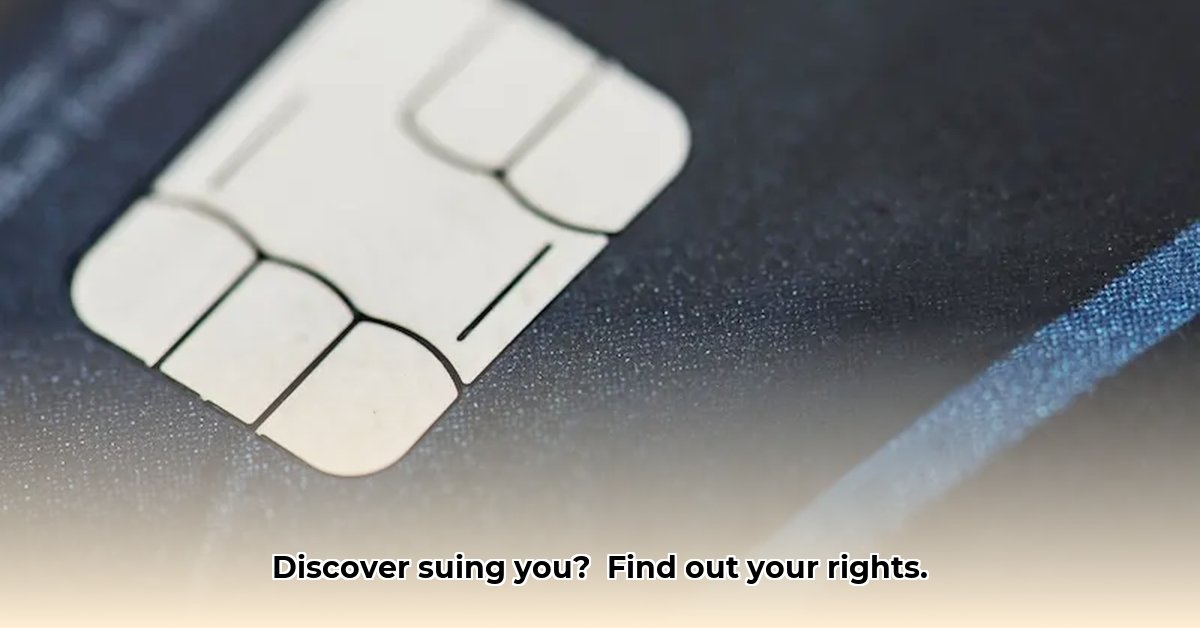
Facing a lawsuit from Discover over credit card debt is understandably stressful. This guide provides actionable steps to protect your rights and navigate this challenging situation. We'll cover Discover's debt collection practices, your rights under the Fair Debt Collection Practices Act (FDCPA), strategies for handling a lawsuit, and preventative measures for future financial stability.
Understanding Discover's Debt Collection Practices
Discover, like other credit card companies, follows a staged approach to debt recovery. It begins with missed payments and late fees. More serious actions follow, including increased communication (phone calls, letters) urging payment. They may offer payment plans or debt consolidation options before considering legal action. A lawsuit is generally a last resort, but it's crucial to know it’s a possibility. Remember, the primary goal for Discover is debt recovery.
Your Rights Under the Fair Debt Collection Practices Act (FDCPA)
The Fair Debt Collection Practices Act (FDCPA) is a powerful consumer protection law. It shields you from abusive debt collection tactics. Discover, and any debt collector they use, cannot harass you with excessive calls, use threats, or make false statements about your debt. They must provide written verification of the debt if you request it. Keep detailed records of all communications (dates, times, content) as evidence of potential FDCPA violations.
What if Discover’s actions violate the FDCPA? You have legal recourse.
Steps to Take if Sued by Discover
A lawsuit is serious, but proactive steps can make a significant difference.
Seek Legal Counsel Immediately: Don't face this alone. A consumer rights lawyer can advise you on your options and represent your interests. Early legal intervention is key.
Thoroughly Review the Lawsuit: Carefully examine the court documents. Does the debt amount accurately reflect what you owe? Is the debt legitimately theirs? Your lawyer will help analyze this.
Consider Debt Validation: Formally request Discover to prove the debt is valid and yours. This is a critical step to challenge potentially inaccurate claims.
Explore Settlement Negotiation: Your lawyer can negotiate a settlement with Discover. This may involve a reduced payment amount or a payment plan, avoiding expensive litigation.
Prepare for Court (If Necessary): If negotiations fail, your lawyer will guide you through court preparation—gathering evidence, potential witness testimonies, and courtroom procedures.
Maintain Meticulous Records: Keep detailed records of all communications, including emails, letters, and phone calls. This documentation is crucial for your case.
Preventing Future Lawsuits: Proactive Credit Card Management
Preventing debt problems is far better than dealing with a lawsuit. Effective strategies include:
Budgeting: Create a realistic budget that tracks income and expenses, preventing overspending. Many free online tools can help.
On-Time Payments: Automatic payments prevent missed deadlines and late fees. This single action is crucial for maintaining a good credit score.
Emergency Fund: Having savings for emergencies prevents resorting to credit card debt for unexpected events.
Debt Consolidation (If Applicable): Consolidating multiple debts into one loan with a lower interest rate can simplify payments and improve your financial situation.
Resources and Further Help
Several organizations offer valuable resources and support during debt-related issues:
- National Consumer Law Center: Provides legal resources and consumer advocacy.
- Consumer Financial Protection Bureau (CFPB): A government agency protecting consumers' financial rights.
- Local Legal Aid Organizations: Offer free or low-cost legal services to those who qualify.
Remember: This guide provides general information, not legal advice. Consult a qualified legal professional for personalized guidance. Acting proactively and understanding your rights empowers you to navigate this challenging situation effectively.
Key Takeaways:
- Discover can and does sue for unpaid credit card debt.
- Ignoring a lawsuit will result in a default judgment.
- The FDCPA protects you from abusive debt collection tactics.
- Seeking legal counsel is strongly recommended. Early intervention is crucial.
- Proactive credit card management is the best preventative measure.